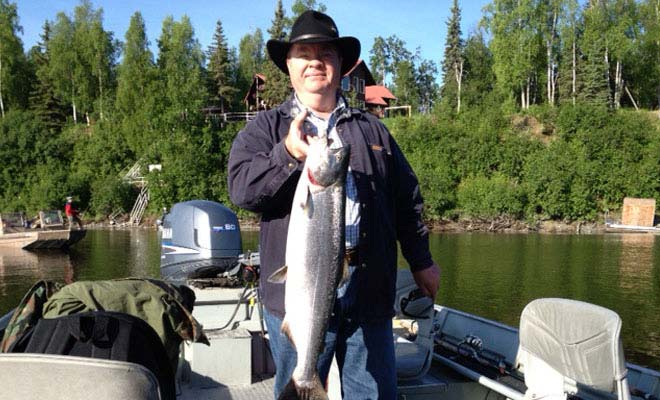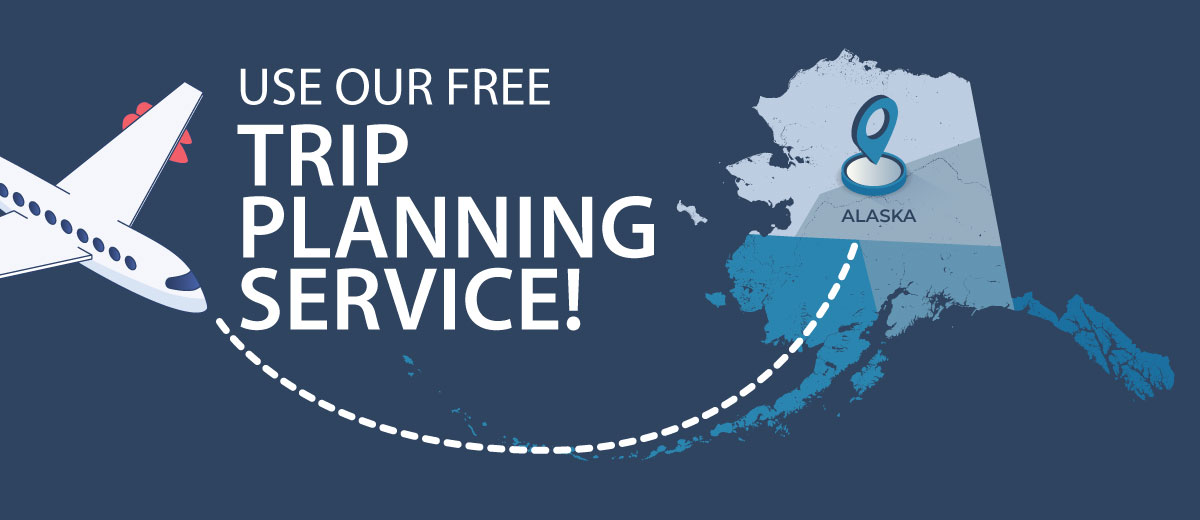
A friend from the Lower 48 called to announce he was coming to Alaska with his dad and brother to do some fishing and, by the way, was I going to be around to show him some good fishing spots? I’m always nervous when someone asks me to take them fishing because I know the disappointment that comes with high expectations. Sadly, or maybe fortunately, he was coming up at a time when I wasn’t available, but I was happy to give him the name of a few good fishing guides.
After our chat I got to thinking: If one doesn’t know the first thing about fishing in Alaska, how does one go about finding a decent fishing guide? There are plenty of guides in Alaska from which to choose, so if you’re looking for a good fishing guide and have no clue where to start or what to look for, here are some thoughts.
1. Check out the outdoor shows. I love the outdoor shows! This is a great place to find guides and outfitters. I’ve pulled the names of guides out of fishing magazines, off internet pages, from coupon books, travel brochures, and even the back windows of pickup trucks, but I book most of my fishing trips at outdoor shows.
The Great Alaska Sportsman Show occurs in early spring each year. There you will generally find a good collection of fishing guides for all different interests and budgets. It’s a great opportunity to meet the guides in person, look over their marketing material, and compare one to another, side-by-side, before you buy. Just as important, there’s the likelihood the guides will be offering specials at these events, and knowing you got a good deal on a fishing trip always enhances the experience.
2. Check out the lodges. I’m not aware of any lodge on any of the salmon streams in Alaska that isn’t connected in some way to one or more fishing guides. A fishing lodge without a fishing guide is like a plane without a pilot, a boat without a skipper, a Toronto city mayor without a crack pipe…you get the idea. The larger lodges will have several on staff that work exclusively for them, and even though their main goal is to have you stay at their lodge and fish with their guides, it’s not always required. But be prepared for the likelihood that they will give preference to their guests.
The fly-out services will have guides at their beck and call, as well. A couple summers ago friends from the Lower 48 were visiting. We enjoyed a great float trip down the Kenai for rainbows and Dollies, but they wanted to catch silvers. We were a little bit between runs and there weren’t any silvers in any of the road system streams yet. We asked around and heard they were catching silvers on the other side of Cook Inlet. We called a local flying service to see if they had anything available. They did, and we ended up with a half-day trip to Big River Lake for sockeyes and silvers, complete with a guide. We caught our limit and were entertained by the bears for a great Alaska fishing experience!
3. Check out the deals. One of the best fishing guides I’ve ever hired I found by way of aGroupon promotion. A Kenai guide was trying to get his name out there to build market share. He offered a deal that was just too good to pass up, so I didn’t and bought a full-day float trip on the Kenai for about half the going rate! Even if he was a lousy guide, I knew I’d be getting a full-day of fishing for about the same price as a raft trip. At that price I couldn’t lose, and the fishing turned out to be phenomenal!
4. Find someone who’s been at it for a while. It’s not difficult to find a good guide, but it’s a good idea to find someone with experience. There’s no shortage of young, idealistic men from the Lower 48 intent on living the dream of being a fishing guide in the Alaska wilderness. Let’s face it, young idealistic women from the Lower 48 dig it. And even though they are very enthusiastic about fishing in Alaska, if they haven’t been fishing the river you want to fish for at least a few years – and I mean fishing it every day – then it’s likely you’ll come away from that experience less than satisfied. So find someone with a track record.
Quite often I can get a good read on the experience level of a guide just by chatting with him. A couple of well-placed questions can reveal a lot, such as, “What size magnet do you use to catch steelhead trout?” Or, “If you’re fishing with your wife and your boat overturns, which do you rescue first, the fishing gear or your wife?”
If a prospective guide doesn’t have a track record and you want to take a chance, at least make sure you’re paying considerably less than the going rate for their services. I’ve occasionally taken a chance on a new guide who was offering a great deal for a day of fishing, and some of those chances paid off very well, indeed.
5. Get some references. It doesn’t hurt to check with someone who’s fished with the guide previously. I’ve fished with many guides over the years, and there were very few who didn’t come with recommendations, usually from a good friend or a friend of a good friend who had fished with him or her before.
Everybody’s experience is going to be different, but you can at least confirm some basics: He has a boat and it floats; his gear isn’t falling apart; he doesn’t tell you to meet him at 4:00 A.M. and then show up at 5:30 A.M. – or not at all (yes, I’ve been stiffed by a guide); he bathes regularly (more than once a week…and you can tell, even from a distance); he arrives sober. You know, the basics.
6. Find someone who is friendly and wants to help you catch fish. Curmudgeons and introverts don’t make good fishing guides. Not only are they horrible conversationalists, but they scare the fish. On the other hand, tyrants, bullies, and hyperactive adults don’t make good guides, either. They scare the children…and they scare me. One hyperactive adult guide on the Situk River who was just a little bit too handsy made for a lousy fishing experience. Maybe it’s just me, but I think most fishermen don’t like being yelled at, jostled about, and manhandled by their guide. And hearing a booming, “You idiot!” spouted with every lost fish wasn’t helping the level of my self-esteem or the amount of his gratuity.
When choosing a guide, knowledge of the river is helpful, as is a demonstrated ability to catch fish. And, of course, a love of fishing is essential. But what defines a really good guide for me is someone who enjoys being around people. I want a guide who doesn’t take life too seriously, has a good supply of stories about living and fishing in Alaska (whether they’re true or not), and loves telling them. A really good fishing guide is part Grizzly Adams and part Garrison Keillor; if you get one like that it will make for a very memorable outing, even if you don’t catch many fish.
7. What’s it going to cost? That depends on where you fish, with whom, and whether you go half-day or full-day. In my experience,many guides offer both half-day and full-day trips. Which one you book will likely depend on what you’re fishing for and where. For me, it doesn’t make a lot of sense to fish more than half a day for kings. It’s great being on the Deshka River and landing your king at 6:21 A.M., but if you’ve got three other folks who haven’t landed theirs, it’s better to have only four or five hours to sit and do nothing rather than eight or nine.
I’ve done most of my king fishing in the Mat-Su Valley, since the chances of catching anything on the Kenai and Kasilof seem to diminish each year, and more often than not a half-day trip is long enough to put a king in the cooler. Half-day trips are usually sufficient for sockeyes and silvers, too. But when it comes to floating the Kenai for rainbows and Dollies, I almost always book a full day. If it’s October, when daylight starts getting scarce, I’ll book a half-day trip, but otherwise there’s just no reason to hurry things.
Prices vary, but I’ve paid as little as $100 for a half-day float trip on the Kenai, and as much as $265 for a full-day float trip through The Canyon. Three days of floating on the Situk River in Yakutat, along with three days and nights of lodging and meals (airfare and alcohol not included), was about $2,600. Fishing in the Mat-Su Valley will cost about $150 to $185 for a half-day trip, $250 to $300 for a full-day trip. The fly-out trip to Big River Lake was $350 and included airfare and the guide.
In this day and age when it seems just about everything is paid for with some kind of plastic, it’s good to know that pretty much all guides take credit cards. When you book, be prepared to pay a deposit equal to half the cost of the trip, and be sure to confirm their refund policies. Most guides require a week or two’s notice in order to refund the full price of your trip if you cancel, and that’s fair. If you have to cancel, it’s been my experience that most guides will give you some credit, maybe even full credit, towards another trip if you book it right away, especially if you fish with that guide frequently and are responsible for pushing other business his way.
8. Book early! Like cheap airline seats, prime concert tickets, and just about any kind of ammunition, the good guides and the prime fishing dates get scooped up quickly, so book early. Some guides will let you book a year or more in advance, and others won’t start taking reservations until after the start of the calendar year. If you have a favorite guide, find out when he or she starts filling up their calendar and get back to them as soon as their phone lines are open.
I followed up with my friend following his visit to Alaska and it turned out that my guide recommendations worked out very well. I was a hero and the myth surrounding my fishing prowess survived another season.
###
Chuck Brady is a self-described “lazy fisherman” devoted to getting the maximum adventure with a minimum of effort. You won’t find him on the saltwater because he hates throwing up, but you will find him, beverage in hand, kicking back in a guided jet boat on the Deshka River fishing for kings and silvers, or relaxing on a drift boat (with someone else doing the rowing) on the Kenai, bouncing beads for rainbows and Dollies. You can e-mail Chuck at cbrady@chuckbrady.com.


